 The University of Greenwich provided a great setting for our most recent UK Learning Analytics Network meeting on 23rd Nov 2017. It is recorded in 3 sections:
The University of Greenwich provided a great setting for our most recent UK Learning Analytics Network meeting on 23rd Nov 2017. It is recorded in 3 sections:
Part 1: David Maguire (the latter part of his address), Phil Richards, Rob Wyn Jones, Mark Harrington (40 mins 32 secs)
Part 2: Suzanne Owen, Michael Web, Panel Session (2hrs 5 mins 30 secs)
Part 3: Christine Cooper & Karl Molden (29 mins 10 secs)
Unfortunately Andrew Cormack’s presentation was not recorded. However much of his thinking on GDPR is captured in his blog posts on the subject.

We started off with a welcome address by Prof David Maguire, Vice Chancellor of the University, who has a strong interest in learning analytics and is Chair of Jisc.
We then had a series of updates from Jisc colleagues on the Effective Learning Analytics Project [ppt 704KB]. Dr Phil Richards, Jisc’s Chief Innovation Officer, kicked this session off with the latest news and his vision for the future. He announced a new joint exploration with Turnitin of how to use assessment data held in that system for learning analytics.
Phil also discussed how SolutionPath Stream will now be fully integrated into Jisc’s learning analytics architecture.

Phil’s vision is of learning analytics transitioning through various stages to become ever more sophisticated, with personalised and adaptive learning becoming increasingly feasible.
Rob Wyn Jones then updated us on Jisc’s plans for its Learning Analytics Service. The Beta Service will be active until 31st July 2018. The fully-supported service will have a dedicated helpdesk, user groups and product development roadmaps. There are currently 18 Pathfinder Institutions implementing the service and there are 15 further free of charge places available for 2018. From August the service will be charged for. See Rob’s presentation [ppt 704KB] for details of the prices, which have now been agreed.
The Data Explorer and Study Goal products will be continuously enhanced, with Data Explorer including basic case mangement / CRM functionality soon. JLAP, the Jisc Learning Analytics Predictor, which carried out predictive analytics on areas such as which students are at risk, is about to be rolled out with 5 institutions.
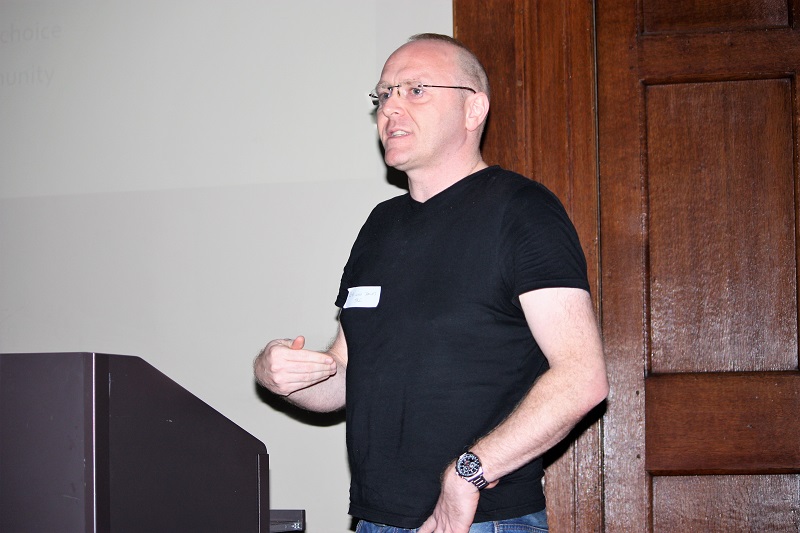
Other technical developments include a new Unified Data Definition v1.3.2 and new plugins for Moodle and Blackboard to extract their data to the Learning Data Hub (the new name for the Learning Records Warehouse). Discussions are underway too with Canvas to extract data from that VLE to the Learning Data Hub.
There’s a growing portfolio of vendors involved in the architecture, both supplying data (e.g. Turnitin, Blackboard) and providing analytics services (e.g. SolutionPath, Tribal).
Finally, Mark Harrington told us about the new Jisc Learning Analytics Purchasing Service, an online portal for products, services and infrastructure that are compatible with Jisc’s learning analytics architecture and service. This is designed to make purchasing easier for institutions, and to add value. Further details are available.
Andrew Cormack, Jisc’s Chief Regulatory Adviser was next up. His hot topic was the forthcoming General Data Protection Regulation (GDPR) and how to handle student consent for learning analytics.
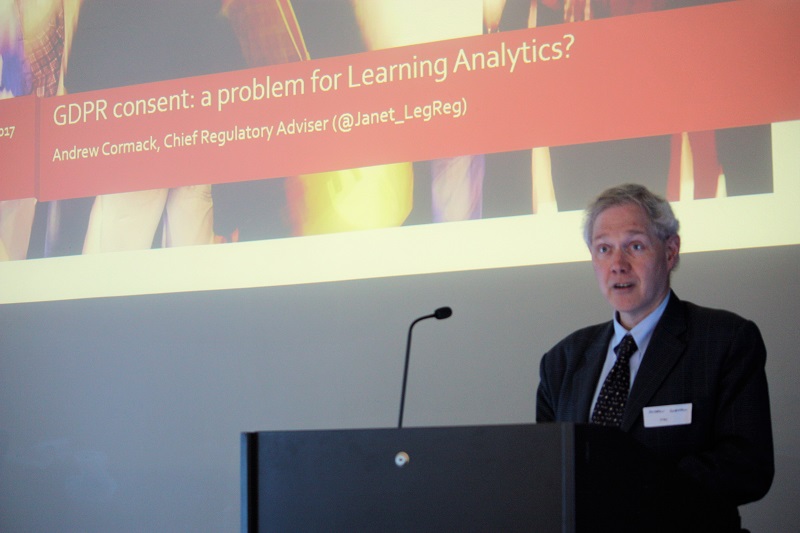
In Andrew’s presentation (pdf 529KB) he argues that using consent as the basis for collecting and analysing student data is not always necessary or sensible. The legitimate interest of the organisation may be a better justification: in this case the legitimate interest would be in improving learning.
 Legitimate interest however cannot be used if the data is ‘sensitive data’, now know in the GDPR as ‘special category data’, such as ethnicity or health data. To use this data, either consent must be sought from the student or there must be a legal obligation to do so.
Legitimate interest however cannot be used if the data is ‘sensitive data’, now know in the GDPR as ‘special category data’, such as ethnicity or health data. To use this data, either consent must be sought from the student or there must be a legal obligation to do so.
Intervention with a student (e.g. a tutor phoning them up because they appear to be at risk) would also require the student to provide their free, informed consent in advance.
After lunch Suzanne Owen from Turnitin presented on ‘Unlocking Turnitin Data with Jisc Learning Analytics’ (ppt 2.52MB). She discussed Kerr Gardiner’s recent survey of UK universities, where he found that all of those he questioned saw a requirement to access all student-related data to support the implementation of learning analytics and to inform metrics such as those in the Teaching Enhancement Framework (TEF).
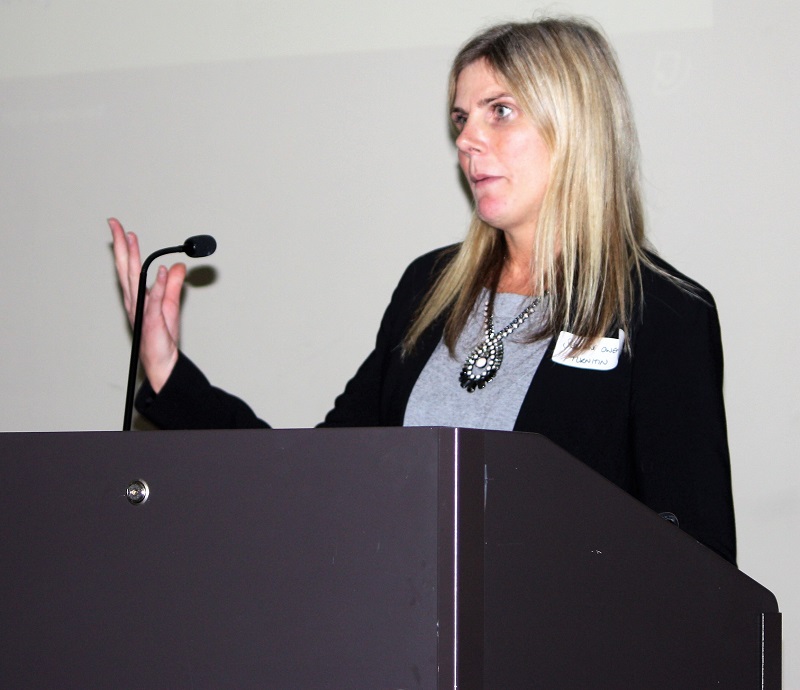
Suzanne discussed how Turnitin works after students submit assignments to it, analysing the assignments’ orginality. She looked at how plagiarism, essay mills and ghost writing are growing problems, and how Turnitin is adding increased functionality to solve this.
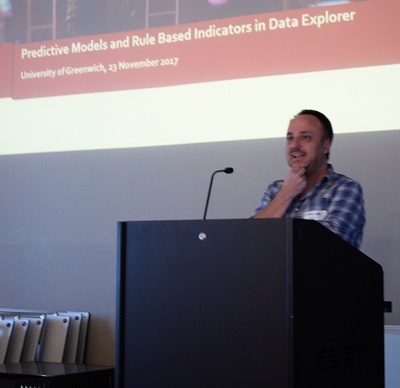
Next up was Jisc’s Director of Analytics and Technology, Michael Webb, explaining how predictive modelling works. He used Jisc’s Learning Analytics Predictor (JLAP) as an example of the various processed involved.
We then had a panel session “Getting your data right for learning analytics” with Adam Cooper (Tribal), Neil Price (University of South Wales), Lee Baylis & Josh Ring (Jisc) and Richard Gascoigne (SolutionPath).
Adam started this with some interesting reflections (pdf 883KB). He suggests that it’s important for someone to take a critical analytical view on the data who has good attention to detail and domain knowledge. You also need someone who knows what the data means in each system and should take an iterative approach to assembling and cleaning your data. Good written data definitions, he says, are essential.
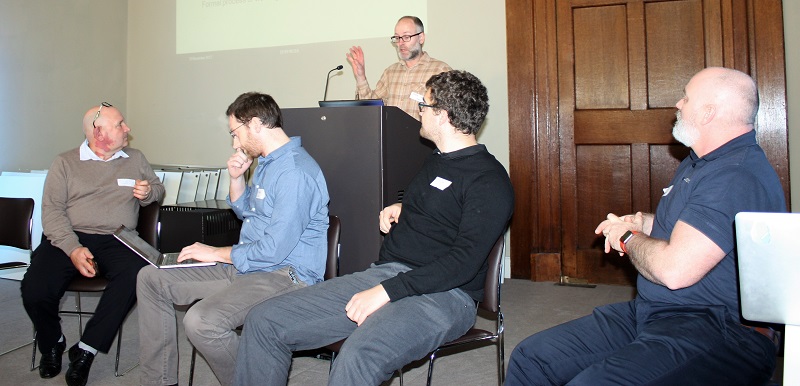
Lee, Josh and Richard all added their perspectives and the audience chipped in with various points and questions. It was great too to have Neil’s perspective from the University of South Wales, as someone who’s been encountering the issues at first hand and has been consistently pro-active in moving things forward. There was a lot of experience and good tips provided by the panel, and the recording is worth watching.
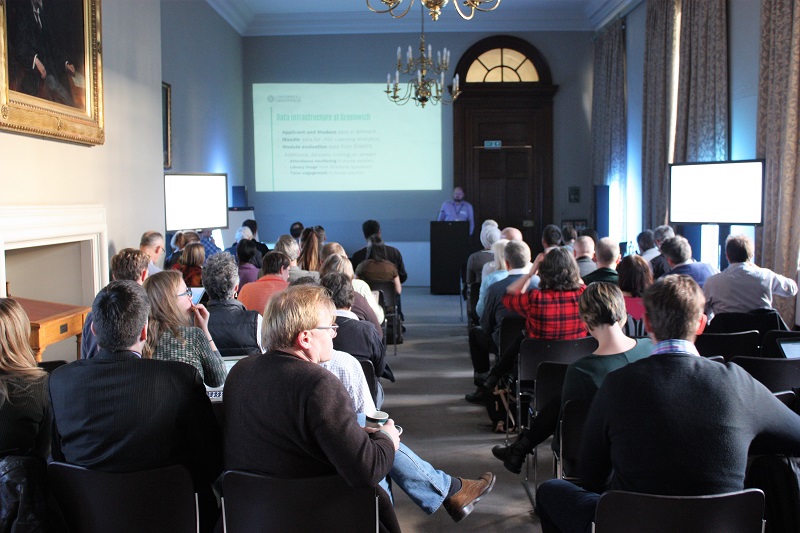
Our next meeting will be at Edinburgh University on 22nd Feb 2018, the agenda and booking form will be posted to this blog in advance. Sign up to the analytics@jiscmail list if you want to receive details of that meeting and other developments in learning analytics by email.
